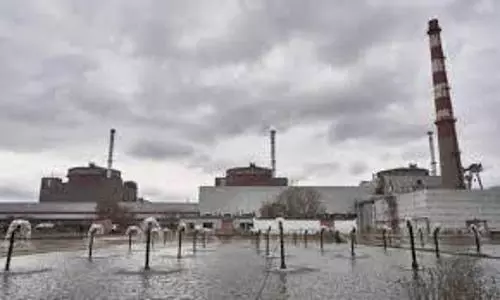
Jerusalem: Facts and Frictions
text_fieldsFew cities could claim the historical contradiction of Jerusalem: born for peace but living amidst war. Sacred to three religious communities, but not accessible to them fully. A capital 'undivided' (as per Israel) with peoples deeply divided.
The city of Jerusalem is a holy place for three religions, Islam, Christianity and Judaism. And there is one place there shared between all the three, the Temple of Mount. Jews see the city of Jerusalem as one with a special status in Jewish religious law. Jewish history abounds in hallowed references to events there and around it. Jews outside Jerusalem pray facing its direction of Temple of Mount, the first temple - built by King Solomon. So did the Muslims during Messenger Muhammad’s time using Masjid al Aqsa as qibla (facing direction for five times prayer), until under divine command the Messenger shifted the direction to Makkah. Further, Prophet Muhammad as per the Quran, made his ascension to the heavens from Masjid Al-Aqsa after being flown there from the Holy mosque in Makka, by angel Gabriel on the night of Isra and Mi'raj, a year before his migration to Madina Today for Muslims, Al-Aqsa mosque in Jerusalem is their third holiest place for worship, after Makkah and Madina - only the same three mosques qualify for Muslim pilgrimage. For the Christians, Jerusalem is the place where Jesus was brought as a child, and as per the Gospels, he preached and healed. Biblical references abound of the life of Jesus connected with Jerusalem, ending with those of his Last Supper in Jerusalem, crucifixion and burial nearby and resurrection.
Forget about the current Jewish occupation and settlements there; even before disturbing the status of such a city, any government will think twice about what raw nerves it would be touching. Not for nothing did Aaron David Miller, who has worked for long in US Democratic and Republican governments write recently in comments for CNN in the light of US President Donald Trump's decision to shift US embassy from Tel Aviv to Jerusalem:"Having worked at the State Department on Arab-Israeli negotiations for the better part of a quarter century, I came up with more than my fair share of half-baked ideas. But the one issue I was smart enough to avoid - and I advised every Secretary of State to do the same - was Jerusalem. My advice was simple: don't play with the most sensitive and volatile issue in the negotiations."
.jpg) But if collective wisdom does not seem to enter the Trump ears, the vicious whisperings of his pro-Zionist coterie and conscience seem to enter the Trump years profusely. Nothing else can be read into his decision announced on 6 December which marked a major departure from US policies ever since the birth of Israel – to move the US embassy to Jerusalem. It also ran counter to the global consensus, at least in the current Israel vs Arab equations, that the status of Jerusalem is something to be evolved as part of a comprehensive solution to the Palestine problem.
But if collective wisdom does not seem to enter the Trump ears, the vicious whisperings of his pro-Zionist coterie and conscience seem to enter the Trump years profusely. Nothing else can be read into his decision announced on 6 December which marked a major departure from US policies ever since the birth of Israel – to move the US embassy to Jerusalem. It also ran counter to the global consensus, at least in the current Israel vs Arab equations, that the status of Jerusalem is something to be evolved as part of a comprehensive solution to the Palestine problem.
Some history
To know what is wrong with Trump's move, it is important to trace the history of Jerusalem. The United Nations partition plan drawn up in 1947 (made in the background of decades of Jewish settlements, uprooting of native Palestinians, British colonialism including capture of Jerusalem) envisaged Jerusalem as a separate "international city". The special status was based on Jerusalem's religious importance to the three Abrahamic religions. But the war that followed Israel's declaration of independence one year later left the city divided. When fighting ended in 1949, the armistice border -- often called the Green Line because it was drawn in green ink -- found Israel in control of the western half, and Jordan in control of the eastern half, which included the famous Old City. Following the UN's recommendation to divide Palestine, Zionist forces took control of the western half of the city and declared it part of its state.
Then what of the Palestinians there? Despite Israel's de facto annexation of East Jerusalem, Palestinians who live there were not granted Israeli citizenship. At present, they are no small number: there are today 420,000 Palestinians in East Jerusalem. They have "permanent residency" ID cards, but they also have temporary Jordanian passports without a national identification number. i.e, they do not have full Jordanian citizenship. And in Jordan, they need a work permit to work and do not have access to governmental services and benefits such as reduced education fees.
In other words, Palestinians in Jerusalem are essentially stateless, stuck in a no man's land - they are not citizens of Israel, nor are they citizens of Jordan or Palestine.
Then how does Israel treat Palestinians in East Jerusalem? Scenario one: They treat them as foreign immigrants who live there as a favour granted to them by Israel and not by right, even though/if they are born there. And to maintain their residency status, they have to meet certain requirements and thus are at the constant risk of having their residency revoked.
It is even more risky for any Palestinian to live outside the Jerusalem border for a certain period of time, either in a foreign country or even in the West Bank, because in that case he may lose the right to live there. That is scenario two.
Scenario three of being stateless is this: If Jerusalemite Palestinians cannot prove that the "centre of their life" is in Jerusalem and that they have lived there continuously, he loses the right to live in their city of birth. They must submit dozens of documents including title deeds, rent contracts and salary slips. And if he obtains another country's citizenship, then again he forfeits his claim to his status. Since 1967, Israel has revoked the status of 14,000 Palestinians, according to Israeli rights group B'Tselem.
On the other hand, any Jew around the world enjoys the right to live in Israel and to obtain Israeli citizenship under Israel's Law of Return.
.jpg)
Then came the six-day war
Though East Jerusalem was occupied by Israeli only at the end of the 1967 Six-day War - with Israel against Egypt, Syria and Jordan - West Jerusalem had already been captured in the 1948 Arab-Israeli war. Ever since then, the status of Jerusalem is one of the major sticking points in peace talks between Israel and the Arab side, notably the state of Palestine.
During the 1967 war, when the western half of Jerusalem was already in Zionist hands, Israel captured the eastern half of Jerusalem, which was under Jordanian control at the time, and proceeded to effectively annex it by extending Israeli law to the territory, bringing it directly under its de-facto jurisdiction. This was in blatant breach of international law. The annexation was not recognized by the United States either. But that said, the US had consistently acted throughout history to save the face and legitimacy of Israel before the world and at the United Nations.
Further down the line it was in 1980, through a legislation that Israel passed the "Jerusalem Law", which declared "Jerusalem, complete and united, is the capital of Israel", thus formalising its annexation of East Jerusalem.
How others saw it
The international community's response to this Israeli decision came through the UN Security Council Resolution 478 in 1980, declaring the law "null and void". The illegal Israeli annexation of East Jerusalem violates several principles under international law, which states that an occupying power does not have sovereignty in the territory it occupies. Thus, in the eyes of the international community, East Jerusalem officially is regarded as occupied territory.
But to say that no country in the world ever recognized Jerusalem as Israel's capital, would be slightly incorrect. For some countries including the US and Russia, do have a different history. Russia announced its recognition of West Jerusalem as the capital of Israel, and East Jerusalem as "the capital of the future Palestinian state." And before 1980, some countries including Netherlands and Costa Rica did even have their embassies in Jerusalem. (They all gradually moved the embassies out of Jerusalem; in 2006, Costa Rica and El Salvador became the last to move their embassies out of Jerusalem, joining the rest of the world)
.jpg)
Some countries do still have consulates in Jerusalem, including the United States, whose facility is located in west Jerusalem. Other countries - such as Britain and France for instance - have a consulate in the eastern part of the city, which serve as their countries' main representation in the Palestinian territories.
But to make no mistake, the US has never had its 'embassy' in Jerusalem. It has always been in Tel Aviv. Then where are the other embassies in Israel? All are in the commercial capital, Tel Aviv, although some countries have based their consulate offices in Jerusalem.
Occupation through settlements in Jerusalem
Ever since its occupation, Israel has been continually building up settlements in East Jerusalem. This is evidently to consolidate Israel's control over the city, to make it a case of fait accompli, but that again is considered illegal under international law. At different stages of settlement, in the background of worldwide condemnation, the UN affirmed through several resolutions that the settlement project is in direct contravention of the Fourth Geneva Convention, which prohibits an occupying country from transferring its population into the areas it occupies.
Thus currently, about 200,000 Israeli citizens live in East Jerusalem under heavy army and police protection; and the largest single settlement complex is housing 44,000 Israelis. To add to Palestinian agony, such fortified settlements are often scattered between Palestinians' homes, and they infringe on the freedom of movement, privacy and security of Palestinians. Thus when Israel claims Jerusalem as its undivided capital, the ground reality is that city is deeply divided. It is not merely a division into two communities, but also in the status accorded to the two nations: Palestinians live in apartheid-like conditions, and Israelis enjoy a sense of normality and guaranteed citizen rights.
.jpg) US legal and diplomatic position on Jerusalem
US legal and diplomatic position on Jerusalem
Things got a bit more complicated in 1989: Israel took steps to lease to the US a plot of land in Jerusalem for a new embassy – for 99 years at a nominal $1 per year. The plot has not yet been developed, and it remains an empty field, but the leasing agreed by both sides symbolizes for Israel especially, on the one hand a legitimacy for its occupation of Jerusalem, and on the other a mark of US's agreement in principle to recognize Jerusalem as its capital.
In 1995, the US Congress passed a law (Jerusalem Embassy Act of 1995) requiring America to move the embassy from Tel Aviv to Jerusalem by 31 May 1999. Pro-Zionist advocates of the decision theorized that the US should respect Israel's choice of Jerusalem as its capital, and recognize it as such. Despite the world’s rejection of that decision, it remained in US statute books. Well, that was the theory. Every president since 1995 - Presidents Clinton, Bush and Obama - has declined to move the embassy, citing national security interests. For US expedience, it would amount to throwing diplomatic caution to the winds. So, as provided for in US law, every President has been using the presidential waiver to bypass the obligation to move the embassy to Jerusalem. When the last period of six months was about to expire on 8 Dec, though he missed the deadline, Trump came up with his controversial decision to shift the embassy to Jerusalem.
Although, the physical embassy move may be on hold, the US may now be mulling development of the undeveloped leased plot. Alternately, it can upgrade the existing consulate in Jerusalem into an embassy. There are also those who think that for just underlining the emblematic significance of the decision, the embassy as such can continue in Tel Aviv, and only the US Ambassador to Israel will be placed in Jerusalem to do his daily tasks.























